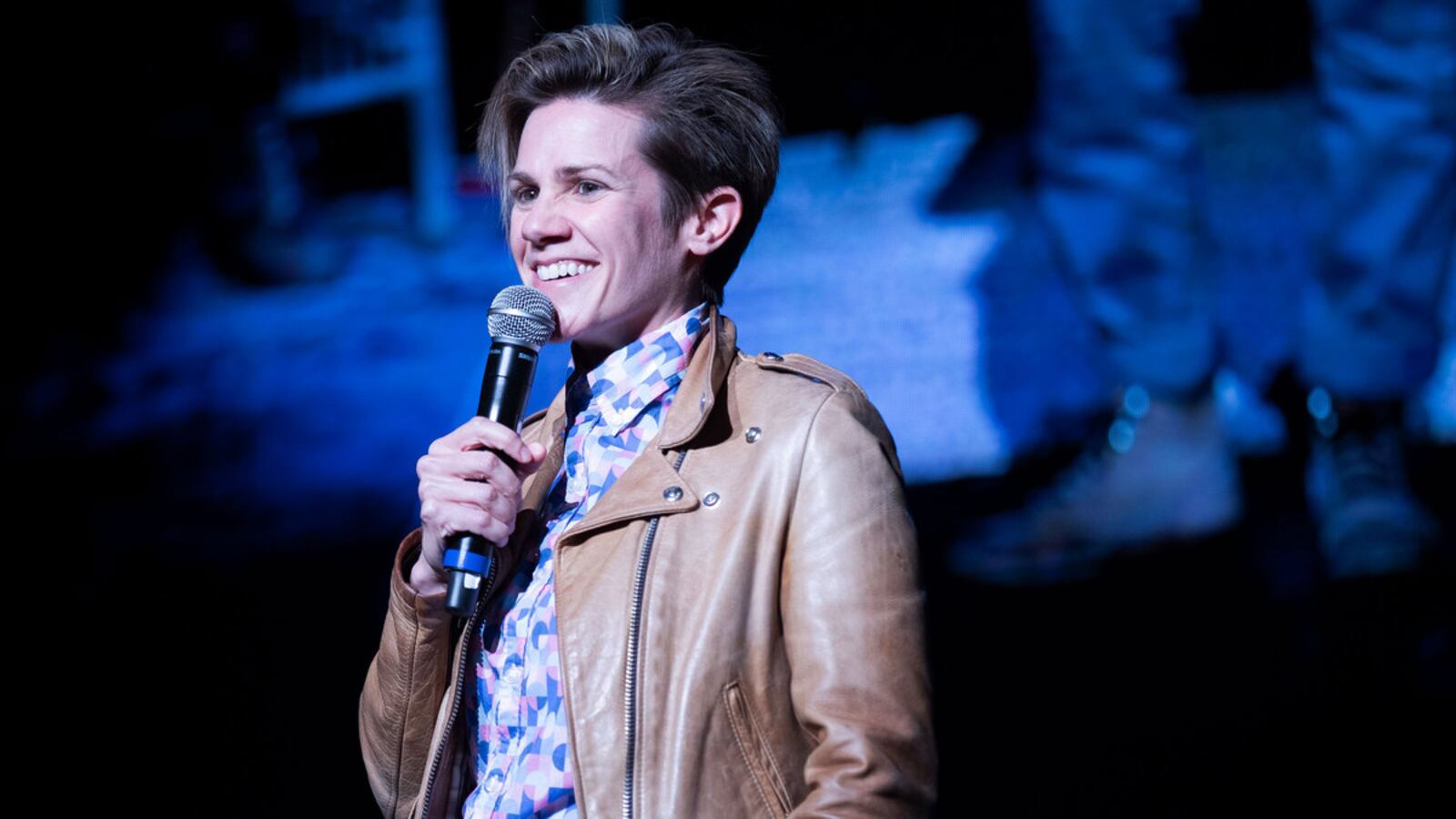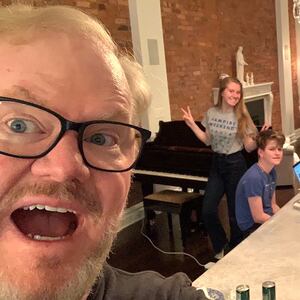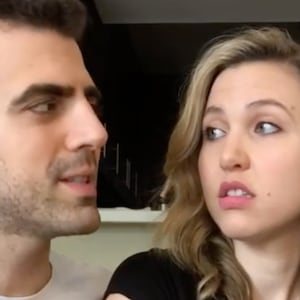Stand-up comedian Cameron Esposito never thought she would be releasing her memoir during a global pandemic. If she had, she probably wouldn’t have called it Save Yourself.
“I cannot believe that that is the title of the book,” Esposito tells me on this week’s episode The Last Laugh podcast. “How that happened is bonkers!”
The book, which has been in the works since she launched her “Ask a Lesbian” series with BuzzFeed Video more than five years ago, chronicles the comedian’s path from devout Catholic girlfriend of the high school football captain in suburban Chicago to somewhat of a gay icon in the stand-up world today.
“By the time I got to college I had this outside world going on and this inside world going on,” she tells me. “I was skating through the world while closeted, which created this difference between what was going on outside and what was going on inside.”
Esposito’s comedy career took off in 2013 following an auspicious late-night stand-up debut on The Late Late Show with Craig Ferguson that somehow concluded with the other guest that night, Jay Leno, shouting “Lesbians rule!” directly into the camera. She went on to co-create the sitcom Take My Wife with then-partner Rhea Butcher and later put out a powerful #MeToo era special called Rape Jokes about her own experience as a survivor of sexual assault.
She was supposed to go on tour this spring to promote the book. But the coronavirus pandemic upended those plans.
“Not one of the things I’m currently doing for work is a skill set I had prior to like three weeks ago,” Esposito says. That has included hosting Zoom conferences with other queer memoir authors and trying to figure out how to do a multi-cam shoot of her stand-up act from her house. “I was rubber-banding a phone to a mop and then another phone is stacked on top of an upside-down garbage can.”
One of her early video-chat sessions with writers and fans was “Zoom-bombed” before that term had even been coined.
“I was on with a bunch of writers I really respect, 500 queer folks who were signed in from their couches and beds and I didn’t know about the default setting on Zoom that folks could share their screen,” Esposito explains. Suddenly “the most hardcore pornography” she had ever seen appeared in front of her. “I could not figure out what was happening,” she adds. “And I broadcast that into hundreds of people’s homes.”
Highlights from our conversation are below and you can listen to the whole thing right now by subscribing to The Last Laugh on Apple Podcasts or wherever you listen to podcasts.
On using stand-up comedy to talk about her queerness
“I started doing stand-up before things were OK with my family. It was a time of enormous tension with my parents. My siblings were on board with my queerness but it was something we didn’t talk about. So there was all this stuff going on and stand-up was the first place where I was really in front of people saying ‘I am gay’ and not getting input back. Although I did get some direct input via heckling or people saying shit after show or people saying they were into it. But it just sort of took away the other person’s ability, right and space to respond and I needed that when I started doing stand-up. I really needed that in my life.”
How coronavirus will change the comedy landscape
“I’m really curious how this time we’re living in now could potentially reorder things in the stand-up world. Because the internet has already democratized comedy. When I was coming up, stand-up was not a democracy. You have to be good to advance, but you also had to know your place. You never got to headline without first open mic-ing, then hosting, then featuring. I switched from improv to stand-up around the same time that Twitter and YouTube were created. But even at the beginning, comics weren’t really using them. People that started on YouTube were really disparaged in the hardcore stand-up world. Because it was like, ‘Fuck you. You have to go out there and earn your stripes by suffering on stage. You can’t jump the line by making videos.’ That is no longer true. And right now, there is no live performance. That’s a massive shift in a decade.”
On writing about her sexual assault experience for the stage versus her book
“For me, that was actually one of the easiest things I’ve ever written, as a stand-up comic. And I don’t mean that the topic was easy. But I literally sat up in the middle of the night and said, ‘Rape Jokes!’ That’s the title. I know I want to put this out, I know I need to find the arc. I loved working on that. Writing it for the book was almost impossible. A story like that, that is that painful and that shameful… in some ways, as a coping skill, I need to take the power out of the thing for me. It’s not necessarily a bad thing, inherently, to give something that is unlivable the lightness that lets you live. Writing about it for the book was a heavier experience, because it didn’t have this pressure-release that I’ve really benefited from. I really love that about stand-up.”
Was there reluctance from streaming services to release a special called ‘Rape Jokes’?
“Yes, there was. You know, I knew what I wanted the content to be and I knew what I wanted the title to be. I think the title is extremely provocative. I also think that the content is not so provocative. And I don’t mean that it is chill. I mean that it is gentle. I’m very strong in my delivery, but it also paints this really full picture of why I think this happened in my life and my opinion about the person who assaulted me. And I just think that it’s not something that people knew a hundred percent what to do with. But I knew what to do with it.”
Next week on The Last Laugh podcast: Star of Silicon Valley and the new Netflix specials Middleditch & Schwartz, Thomas Middleditch.




